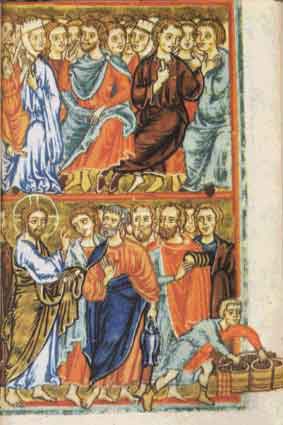Taking the five loaves and the two fish, and looking up to heaven...
Mt 14:13-21

When Jesus heard of the death of John the Baptist, he withdrew in a boat to a deserted place by himself.
John the Baptist was beheaded on orders of King Herod. Did Jesus withdraw to keep himself safe from King Herod? His time had not yet come and therefore, he had to be careful.
But it was also possible that the reasons for going to a deserted place were (1) to pray and (2) to teach his disciples.
The crowds heard of this and followed him on foot from their towns.
To follow Jesus to an out-of-the way place was an inconvenient thing to do. Why did such a huge crowd go through the trouble? Jesus taught in a way that touched his hearers. The crowds wanted to hear Jesus. But Jesus was also known as a wonder-worker. Maybe they wanted to see him work miracles or perhaps they themselves wanted to be cured.
Matthew probably had something else in mind when he related that the crowds followed Jesus to a deserted place. He might be thinking of the Exodus when the Hebrews left Egypt and journeyed through the desert. And this was purposeful on the part of Matthew because he was setting the stage for the miracle of the multiplication of the bread as a repetition of the miracle of the manna at the time of the Exodus.
The miracle of the multiplication of the bread is the only miracle that all four evangelists relate. This miracle must, therefore, be important. Not the miracle itself but the meaning of the miracle. As we shall see, the miracle points to the gift of the Eucharist.
“Five loaves and two fish are all we have here.”
An indication that the concern of Matthew was the Eucharist was the fact that having said that there were five loaves and two fish, only the loaves continue to be mentioned. At the end of the story nothing is said about fish left-overs.
Taking the five loaves and the two fish, and looking up to heaven, he said the blessing, broke the loaves, and gave them to the disciples.
Another indication of the Eucharistic allusion are the verbs used to relate the multiplication of the bread: Taking, looking up to heaven, said the blessing, broke and gave. These are the same verbs one finds in the words of consecration in the Roman Canon (Eucharistic Prayer I).
They picked up the fragments left over—twelve wicker baskets full.
The detail of twelve wicker baskets is no accident. They allude to the twelve tribes of Israel, another indication of Matthew´s intent to point to the Exodus and the gift of manna in the desert. The relationship between the Eucharist and the Exodus-manna is developed in John 6.
The greek word used for the left-over bread is ´klasmata´, a greek word which was used to refer to the Eucharistic bread in the early church. Another indication of the Eucharistic intent of the miracle.
Those who ate were about five thousand men, not counting women and children.
According to a commentator, there must have been somewhere between 20,000 and 30,000 persons whom Jesus fed. This gives us the impression of an abundance of food, so abundant that there were twelve baskets full of left-over bread.
What we have here is an image of a banquet (eating) where food is abundant. This image is precisely the image of the messianic banquet. In other words, Matthew is pointing to Jesus as the Messiah. This did not escape the notice of the crowd in John 6. In fact they wanted to declare Jesus as king, even by force--which prompted Jesus to escape.
...and gave them to the disciples, who in turn gave them to the crowds.
One last detail. Jesus did not distribute the bread to the crowds. It was the disciples who did this. From the practical point of view, this was the best thing to do. But Matthew goes beyond the practical level. He wants to drive home a point--the intermediary role of the disciples in the church.


